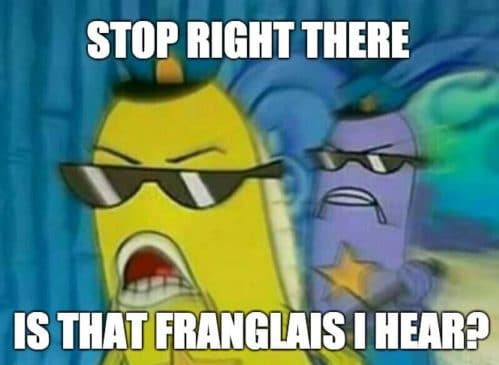BY:
Eric De Grasse
Chief Technology Officer
PROJECT COUNSEL MEDIA
3 June 2022 – I love France. We’ve been based here for 22 years, since our boss moved to Paris from the U.S. We all speak French (in fact you need to be trilingual to work for Project Counsel Media). I’ve sent my kids to French language immersion schools (I am native Dutch so they get that at home). But the kids are way ahead of me when it comes to French slang. Even my France-based based work “get it” more than me but then their average age is 27.
I bought a book of French slang, and it was useless. The French language just zips right along: words and phrases from French speaking Swiss people (“mon dieu!”); words and phrases from North Africans (what’s the term for head butt?). Words and phrases from the Middle East are very popular among certain fringe groups.
Over the decades, French has become Franglais. But the rock of Gibraltar (which actually should be a French rock, according to some French historians) around here is the Académie Française (which is one block from our new offices) and its mission (a tiny snippet follows but there is a lot more at this link if you want a deep dive):
La mission confiée à l’Académie est claire : « La principale fonction de l’Académie sera de travailler, avec tout le soin et toute la diligence possibles, à donner des règles certaines à notre langue et à la rendre pure, éloquente et capable de traiter les arts et les sciences.»
The mission entrusted to the Academy is clear: “The principal function of the Academy will be to work, with all possible care and diligence, to give certain rules to our language and to make it pure, eloquent, and capable of handling the arts and sciences.”
Who cares? Well, the French culture ministry does, which has been heavily involved in the process, noting the video game sector was rife with anglicisms that could act as “a barrier to understanding” for non-gamers. As the article notes, the ministry regularly issues dire warnings of the debasement of its language from across Atlantic.
NOTE: the U.S. has a culture ministry. It’s called Disneyland.
So I read the article “France Bans English Gaming Tech Jargon in Push to Preserve Language Purity” with great interest at it explains:
Among several terms to be given official French alternatives were “cloud gaming”, which becomes “jeu video en nuage”, and “eSports”, which will now be translated as “jeu video de competition”. The ministry said experts had searched video game websites and magazines to see if French terms already existed. The overall idea, said the ministry, was to allow the population to communicate more easily.
So now, E-sports professionals make their livings as “joueur/joueuse professionnel/professionnelle” and compete in “jeu vidéo de competition”. Will those French “joueur-animateur en direct” now abandon the common word everybody uses, “streamer”? Sure, and France will once again dominate Europe, parts of Africa, and the beaver-rich lands in North America. And Gibraltar? Sure, why not?
The translated terms were published in the Journal Officiel de la République – the equivalent of the government Gazette in other nations. It is the definitive record of French government decisions and actions, and the Journal Officiel is also binding on French government employees, meaning all are required to speak only of “squelettage” – instead of the animation technique known as “rigging”.
Our boss, Gregory Bufithis, attended the Sorbonne in Paris in the early 1970s and he remembers waaaaaaaay back then the Académie Française came after “le weekend” and replaced it with “fin de semaine” (“end of the week”). It did not stick. I spoke to him as I was writing this piece and he noted:
The thing is that just literally translating the words doesn’t change the fact that France had no real concept of “the weekend” in the way the English or Americans did. And, in fact, this concept of “the weekend” and “fin de semaine” was actually already in use across other romance languages so you already had “fin de semana” (Spanish), “fim de semana” (Portuguese), “fine settimana” (Italian) without the need to import “weekend” from English. And in France, only Saturday and Sunday are the “weekend”.
And even most Slavic languages adopted weekend without any translation: Víkend, Vikend, uïk-end, vikhidni, vykhadnyja. They ended up doing it roughly 50/50. Likewise modern Celtic languages.
Oh, in Greek? It’s “σαββατοκύριακο”. Hardly ever used.
English is a bit odd in that it’s probably taken more words from French than French ever has borrowed from English. I think that is one reason English vocabulary is so flexible.
And if you really want to dig into linguistics you’ll find that English has the claim to fame by taking the same French word *twice* – “Petite”. So ….
1) Petite -> petty (which morphed from simply “small” to “small minded”)
2) Petite -> petite (small in stature)
“Petty” indirectly came from the masculine form of the French word, « petit », because the second T of « petit » is silent (which is reflected in the spelling pronunciation of “petty”), and because the English word “petit” (with the same pronunciation as “petty”) is still found in legalese, e.g. “petit larceny”.
My son (a gamer) says this new publication will only be important in the offices of those who wrote it.
And the English language? It is an amalgam of many other languages – Old Frisian, old German, old French, old Viking, some Greek, Latin, some Hebrew. The English language does not mind adopting foreign words. The language has been doing that for hundreds of years.
I like that old saying: “English isn’t a language. It’s at least three languages in a trenchcoat pretending to be one.”
